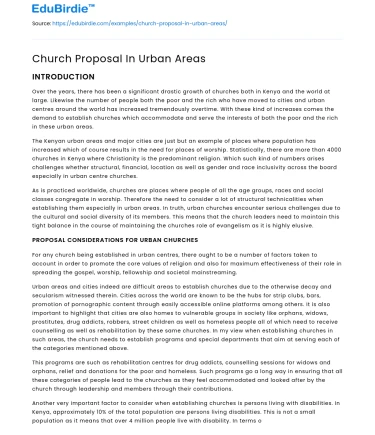INTRODUCTION
Over the years, there has been a significant drastic growth of churches both in Kenya and the world at large. Likewise the number of people both the poor and the rich who have moved to cities and urban centres around the world has increased tremendously overtime. With these kind of increases comes the demand to establish churches which accommodate and serve the interests of both the poor and the rich in these urban areas.
The Kenyan urban areas and major cities are just but an example of places where population has increased which of course results in the need for places of worship. Statistically, there are more than 4000 churches in Kenya where Christianity is the predominant religion. Which such kind of numbers arises challenges whether structural, financial, location as well as gender and race inclusivity across the board especially in urban centre churches.
Save your time!
We can take care of your essay
- Proper editing and formatting
- Free revision, title page, and bibliography
- Flexible prices and money-back guarantee
As is practiced worldwide, churches are places where people of all the age groups, races and social classes congregate in worship. Therefore the need to consider a lot of structural technicalities when establishing them especially in urban areas. In truth, urban churches encounter serious challenges due to the cultural and social diversity of its members. This means that the church leaders need to maintain this tight balance in the course of maintaining the churches role of evangelism as it is highly elusive.
PROPOSAL CONSIDERATIONS FOR URBAN CHURCHES
For any church being established in urban centres, there ought to be a number of factors taken to account in order to promote the core values of religion and also for maximum effectiveness of their role in spreading the gospel, worship, fellowship and societal mainstreaming.
Urban areas and cities indeed are difficult areas to establish churches due to the otherwise decay and secularism witnessed therein. Cities across the world are known to be the hubs for strip clubs, bars, promotion of pornographic content through easily accessible online platforms among others. It is also important to highlight that cities are also homes to vulnerable groups in society like orphans, widows, prostitutes, drug addicts, robbers, street children as well as homeless people all of which need to receive counselling as well as rehabilitation by these same churches. In my view when establishing churches in such areas, the church needs to establish programs and special departments that aim at serving each of the categories mentioned above.
This programs are such as rehabilitation centres for drug addicts, counselling sessions for widows and orphans, relief and donations for the poor and homeless. Such programs go a long way in ensuring that all these categories of people lead to the churches as they feel accommodated and looked after by the church through leadership and members through their contributions.
Another very important factor to consider when establishing churches is persons living with disabilities. In Kenya, approximately 10% of the total population are persons living disabilities. This is not a small population as it means that over 4 million people live with disability. In terms of structure, the church leadership through the designers and architects need to put this category of people in consideration when building church structures in our urban centres.
These considerations include establishment of ramps that would allow the disabled to access the church premises. Setting up proper audio visual systems that accommodate everyone. Hiring sign language interpreters for the deaf and creating designated and special washroom facilities within the church. This assists in promoting inclusivity as the affected persons will feel comfortable enough attending the churches.
Churches in urban centres need to establish a department in the churches that cater for health issues of the congregation. This department should be responsible for handling health related emergencies that may arise during their course of evangelism. In any society, there are surely many cases of emergencies that are bound to occur therefore any church establishment need to anticipate such eventualities and handle them expeditiously to avoid cases of deaths or escalation of the complication in question.
With the recent increase of terrorist activities across the world. Urban churches also need to put in place security, emergency and disaster management mechanisms to not only reduce the risk of occurrence but also to promote preparedness as well as reduce the impact in the event of occurrence. As a matter of huge importance the church needs to put in place systems to combat a situation like fire outbreaks by providing emergency exits, fire extinguishers, adequate ventilation and emergency call numbers in the event of the risk occurring. In addition to that, the church also needs to educate the congregants on disaster preparedness and risk management. This is pertinent in all urban church settings.
CONCLUSION
In conclusion and most importantly, urban churches across the world need to set up inclusive and thorough vetting systems for church leaders. For any society to live peacefully and in harmony, there needs to be a democratic way of choosing leaders, this is not any different from church establishments. In fact, the threshold for selecting church leadership and management should be way above any other normal leaders as this is sort of a reflection of the congregation as well as the church. This process is meant to bring up effective, steadfast leaders who uphold integrity and who are above reproach. This will then have a positive impact on the church spiritual development.
REFERENCES
- Conn, H. M. (Ed.). (1997). Planting and growing urban churches: From dream to reality. Baker Academic.
- Smith, R. D. (2001). Churches and the urban poor: Interaction and social distance. Sociology of Religion, 62(3), 301-313.






 Stuck on your essay?
Stuck on your essay?

